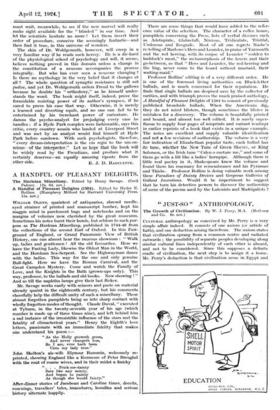A HANDFUL OF PLEASANT DELIGHTS.
The Harleian Miscellany. Edited by Henry Savage. (Cecil Palmer. 12s. 6d. net.)
WILLIAM OLDYS, quaintest of antiquaries, shrewd needle- eyed strainer of printed and manuscript lumber, kept his magpie mind in parchment bags and notebooks and on the margins of volumes now cherished by the great museums. Sometimes his notes burst their bonds, but seldom to such pur- pose as The Harleian Miscellany, published in 1744-46 from the collections of the second Earl of Oxford. In this Fair- ground of England, or Grand Panoramic View of British History, one can almost hear the raucous showman : " Walk up, ladies and gentlemen ! All the old favourites. Here we have the Fasting Lady, likewise the Oldest Man in the World, and the Horsham Sea-Serpent. See the Highwayman dance with the ladies. This way for the one and only genuine Bull-fight. Here we have the Roman Carnival, and the 'Great Campden Mystery. Come and watch the Family of .Love, and the Knights in the Bath (grown-ups only). This way, professor, to the ballads and old books. Now showing ! " And so till the naphtha lamps give their last flicker.
Mr. Savage works easily with scissors and paste on material already quaint in the eighteenth century, but his comments cheerfully help the difficult unity of such a miscellany. These almost forgotten pamphlets bring us into sharp contact with wholly forgotten modes of thought. Claude Duval, " executed at Tyburn, in the twenty-seventh year of his age (which number is made up of three times nine), and left behind him a sad instance of the irresistible influence of the stars and the fatality of climacterical years." Henry the Eighth's love letters, passionate with an immediate fidelity that makes one understand his poem:
" As the Holly groweth green, And never changeth hue, So I am, ever hath been Unto my lady true."
John Skelton's ale-wife Elynour Rummin, welcomely re- printed, showing England like a Kermesse of Peter Breughel with the rout of coarse wives, and in their midst a finicky " . . Prick-me-dainty
Sate like any sainty, And began to painty As though she would fainty."
After-dinner stories of Jacobean and Caroline times, deceits, cozenings, travellers' tales, 'impostures, homilies and serious history alternate. haPPily. , , There are some things that would have added to the refer- ence value of the selection. The character of a coffee house, pamphlets concerning the Press, lists of verbal diseases such as Adstupiate, Glabretall, Nixious, Tridiculate, Tristful, Undosous and Zoografe. Most of all one regrets Nashe's re-telling of Marlowe's Hero and Leander, in praise of Yarmouth and the red herring, with its corpse of Leander " sodden to haddock's meat," the metamorphosis of the lovers and their go-between, so that " Hero and Leander, the red-herring and the ling, never come to the board without mustard, their waiting-maid."
Professor Rollins' editing is of a very different order. He is one of the foremost living authorities on Black-letter ballads, and is much concerned for their reputation. He finds that single ballads are despised save by the collector of rarities, and with triumph proves the much praised anthology, A Handful of Pleasant Delights of 1584 to consist of previously published broadside ballads. When the Americans dig, they do not mind blisters, though sometimes the blister is mistaken for a discovery. The volume is beautifully printed and bound, and almost too well edited. It is surely super- fluous to supply four pages of misprints and variant readings in earlier reprints of a book that exists in a unique example. The notes are excellent and supply valuable identification and not a few revisions of authorship. The volume is a very fair indication of Elizabethan popular taste, each ballad has its tune, whether the Ncw Tune of Green Sleeves, or King Solomon, or the Irish tune "Calen o custure me," and some of them go with a lilt like a ladies' hornpipe. Although there is little real poetry in it, Shakespeare knew the volume and found there his rosemary for remembrance and his Pyramus and Thisbe. Professor Rollins is doing valualAc work among these Paradises of Dainty Devices and Gorgeous Galleries of Gallant Inventions. Would it be impertinent to suggest that he turn his detective powers to discover the authorship of some of the poems used by the Lutenists and Madrigalists l










































 Previous page
Previous page